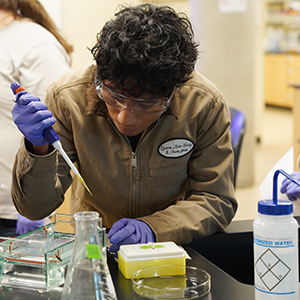Natural and Physical Sciences
 Students who major in the natural sciences may pursue careers in such disciplines
as: astronomy, biology, chemistry, chiropractic, computer science, dentistry, ecology,
engineering, environmental studies, forensic science, geosciences, mathematics, medicine,
meteorology, molecular sciences, pharmacy and physics.
Students who major in the natural sciences may pursue careers in such disciplines
as: astronomy, biology, chemistry, chiropractic, computer science, dentistry, ecology,
engineering, environmental studies, forensic science, geosciences, mathematics, medicine,
meteorology, molecular sciences, pharmacy and physics.
An education grounded in the study of the natural world provides the intellectual skills to make life decisions and is an important reason why natural and physical sciences are part of a liberal arts education. Understanding the natural world is part of being an educated person. The natural and physical sciences teach discipline and organization of knowledge and require each student to learn important critical thinking skills that can be applied in other disciplines and in other aspects of their lives.
All students from Wenatchee Valley College and the colleges and universities they transfer to are required to take general university requirements (GURs) that involve the main disciplines of a liberal arts education. This education includes the natural and physical sciences taught at WVC.
Students who complete the natural sciences requirement for the AAS or AST degree will be able to:
- Meet transfer requirements for 4-year institutions and be prepared to major in science, technology, engineering, or mathematics
- Possess basic skills in the use of laboratory equipment, making experimental measurements, and making scientific observations. They also will be able to keep proper records of scientific observations and measurements, and be able to report experimental findings in a comprehensive lab report.
- Recognize, explain, and communicate mathematical relationships in measurements and observations and the science disciplines in general.
- Explain their experimental and observational results in terms of scientific theory.
- Use scientific methods to determine the validity of claims about nature, explain their experimental and observational results in terms of scientific theory, and tell the difference between speculation, hypothesis, and theory.
- Use their scientific literacy to better understand news reports about scientific topics. Students will apply scientific principles beyond the lab and classroom.


